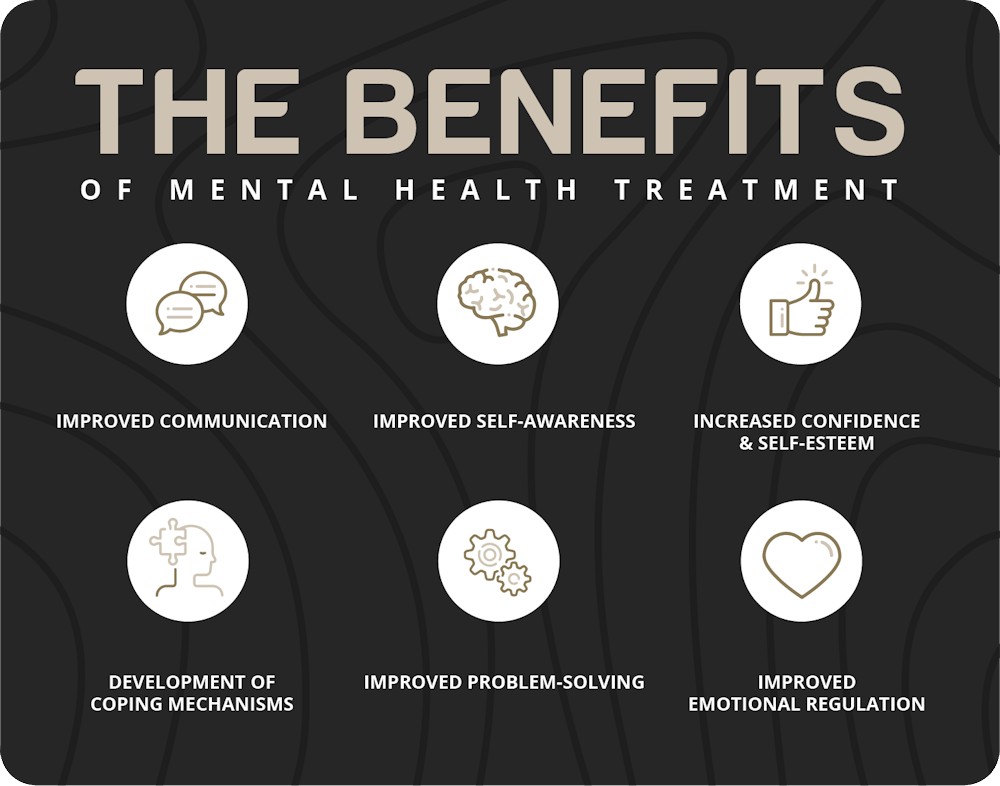The Main Principles Of Mental Health Counseling
The Main Principles Of Mental Health Counseling
Blog Article
Some Known Details About Mental Health Counseling
Table of ContentsMental Health Counseling for BeginnersThe Buzz on Mental Health CounselingMental Health Counseling for BeginnersUnknown Facts About Mental Health Counseling10 Simple Techniques For Mental Health Counseling
Via treatment, you can obtain understanding right into your very own patterns of habits and communication, which can result in more fulfilling and satisfying connections with friends, family, and romantic partners. What we assume, we manifest. If you're taken in with unfavorable feelings and unfavorable thoughts that are interfering with your life, treatment can aid., or there are other adverse methods you behave. Therapy can aid you change those behaviors that are having an adverse effect on your world and relationships.

Getting treatment to attend to certain facets of your life can assist you be more productive in other locations, consisting of work.

Mental Health Counseling Fundamentals Explained
There are also a lot more advantages of treatment than just the ones we have discussed., or develop relationships (enchanting or those with family members or friends) in a healthy and balanced means.
For the objective of today research, viewed benefits and barriers to psychological wellness help-seeking are being discovered. Previous study discovered that viewed barriers have a considerable effect on college students' health behavior selections (Von Ah, Ebert, Ngamvitroj, Park & Kang, 2003). Regarded advantages and barriers to help-seeking were specifically picked as a result of their impact on decision-making and eventually action (Glanz, Rimer, & Su, 2005).
The here and now research seeks to examine whether preconception functions as a barrier to therapy amongst university student. Eisenberg et al. (2011) recommended that suspicion concerning therapy efficacy is an additional obstacle to taking part in treatment. Research findings revealed that university pupils backed several obstacles to taking part in therapy. Mental Health Counseling. Among these were: (1) favoring to take care of mental wellness issues themselves, (2) not having adequate time to join therapy, (3) questions concerning whether mental health and wellness treatment is efficient in remediating troubles, (4) a belief that stress is typical or the problem will certainly improve without therapy, (5) lack of money, and (6) stress regarding what others would certainly think if they learnt about therapy engagement.
Team in university psychological wellness facilities might be viewed as hostile, and long wait times for services may be "off-putting" for pupils. Variables promoting extra favorable mindsets are typically at the opposite pole of those factors recognized as obstacles.
Some Known Details About Mental Health Counseling
One in 3 (34.6%) reported residing on campus and one in 4 (23.3%) reported dealing with moms and dads. Almost fifty percent of trainees were involved in school organizations and 1 in 10 reported remaining in a fraternity or sorority. Even more than one-third of students (38.1%) reported that they had a family members member or friend with a detected mental health and wellness disorder.

Fascination About Mental Health Counseling
Univariate F-tests identified particular subscale products that significantly varied. Ladies were much less most likely than men to perceive individuals who go to counseling as mentally weak, individuals who go to therapy as insane, to really feel that people with mental health and wellness issues ought to deal with issues on their own, that people that most likely to therapy as not able to resolve issues, that people who go to counseling slouch, and to really feel that people that go to counseling are different from regular individuals in an adverse means.
In a similar way, research study results revealed that ladies were considerably less most likely than males to hold stigma-related perspectives. This follows previous research study which also discovered that men hold higher degrees of perceived preconception than women (Chandra & Minkovitz, 2006). Based upon study searchings for, it is apparent that men might be less most likely than females to seek therapy due to reduced perceived obstacles along with high stigma-related mindsets.
How Mental Health Counseling can Save You Time, Stress, and Money.
Additionally, university health professionals may use instructional programs targeting men with information on the benefits of mental health and wellness treatment and the relevance of looking for help when needed. All strategies ought to be examined with future research study to establish the result on university student, specifically men. Unlike basic populace research studies which expose that ladies are more probable to seek psychological health solutions contrasted to males (Haunstein et al., 2006; Mackenzie, Gekoski, & Knox, 2006), today research located no substantial distinctions in the number of viewed barriers to help-seeking behaviors based upon sex.
Researchers speculate that this is largely because of conventional social norms and sex functions that characterized men based on toughness and lack of psychological expression (Addis & Mahalik, 2003; Ang, Lim, Tan, & Yau, 2004; Mojtabai, 2007). On the whole, there have been mixed outcomes among the university student population pertaining to sex distinctions (Rosenthal & Wilson, 2008). This finding was unanticipated and could look at this site highlight that those that had obtained counseling had a better idea of delay times and other "access" obstacles that may i was reading this make it hard to begin therapy. Possibly, individuals who have actually received therapy view a lot more obstacles than individuals who have actually not received counseling since seeking therapy services once again can include fear of self-disclosing personal details to a new therapist.
Report this page